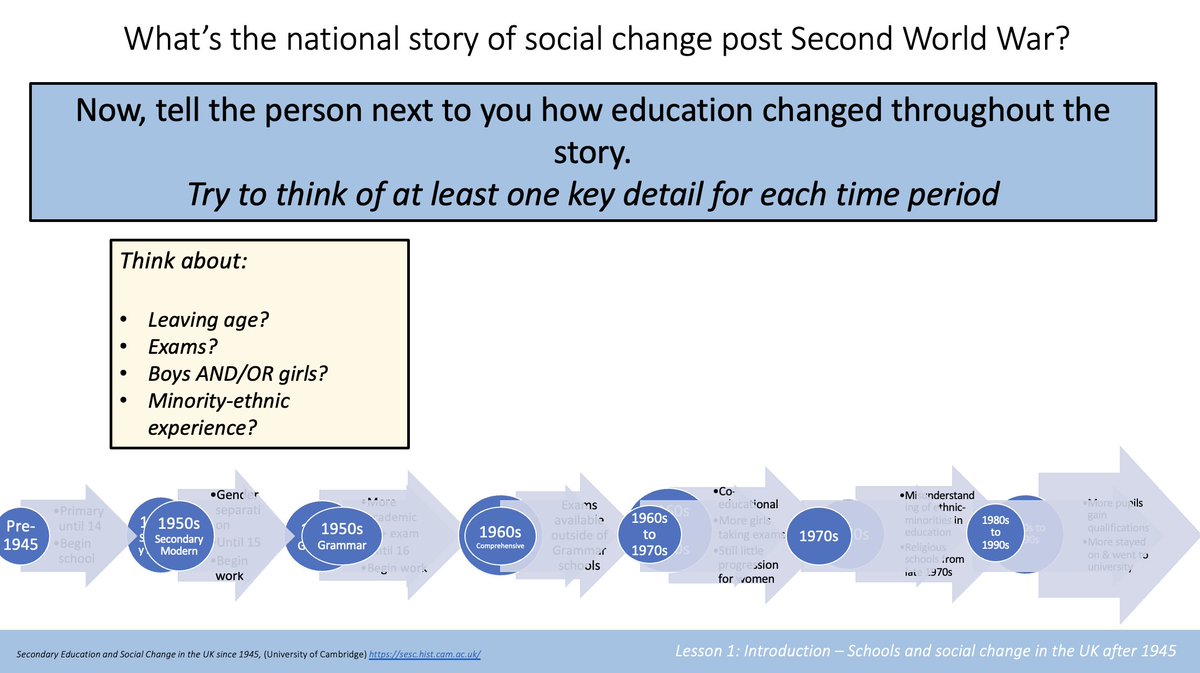
[🧵1/10] Today for our Friday ‘deep dive’ into our KS3 history resource packs we’re looking at @hannahcusworth’s pack on ‘Race and Ethnicity’ ➡️ a 7-lesson enquiry asking:
What do secondary schools reveal about changing attitudes towards race in England since 1945?
What do secondary schools reveal about changing attitudes towards race in England since 1945?
[🧵2/10] Lessons examine experiences discrimination & how communities of colour challenged racialized inequalities & racism
Teachers, please note ➡️ this enquiry addresses racism and discrimination & some primary source materials contain racist/discriminatory language
Teachers, please note ➡️ this enquiry addresses racism and discrimination & some primary source materials contain racist/discriminatory language
[🧵3/10] Lesson 1: Introduction - Schools and Social change in the UK after 1945
All packs start with this (optional) lesson on the big picture of UK social change post-1945, feat. a timeline activity for pupils & a chance to integrate your own school’s history into the story
All packs start with this (optional) lesson on the big picture of UK social change post-1945, feat. a timeline activity for pupils & a chance to integrate your own school’s history into the story

[🧵4/10] Lesson 2: Small Numbers?
Pupils put post-1948 migration to Britain from South Asia & the Caribbean into a longer historical context, & explore black British experiences of going to school in the UK before 1939 through case studies based on oral histories & photos

Pupils put post-1948 migration to Britain from South Asia & the Caribbean into a longer historical context, & explore black British experiences of going to school in the UK before 1939 through case studies based on oral histories & photos


[🧵5/10] Lesson 3: Assimilation & Integration?
Looking at state & school responses to pupils of colour in British schools in the ‘60s & ‘70s, w/ a case study of ‘bussing’. Historian @hisnameissatya discusses sources in a video made for the enquiry
➡️

Looking at state & school responses to pupils of colour in British schools in the ‘60s & ‘70s, w/ a case study of ‘bussing’. Historian @hisnameissatya discusses sources in a video made for the enquiry
➡️


[🧵6/10] Lesson 4: Realisation?
Pupils study the responses of communities of colour to the systemic discrimination & racism faced in the education system, focusing on community activism and resistance, using photos, newspapers, newsletters, & films
Pupils study the responses of communities of colour to the systemic discrimination & racism faced in the education system, focusing on community activism and resistance, using photos, newspapers, newsletters, & films

[🧵7/10] Lesson 4 includes pupils working on a video with the historian and education specialist Paul Warmington, who offers accessible interpretations & context on several key sources on the history of black education in Britain
➡️
➡️
[🧵8/10] Lesson 5: Conflict?
This lesson is all about the 1970s and 1980s: rising racial tensions on Britain’s streets and in schools, the rise of the far right & anti-racist activist & teacher responses
This lesson is all about the 1970s and 1980s: rising racial tensions on Britain’s streets and in schools, the rise of the far right & anti-racist activist & teacher responses

[🧵9/10] Lesson 6: Multiculturalism?
Pupils explore the rise of state-sponsored multicultural education in British schools in the 1980s, and some of the criticisms against it...
They look at gov. reports, activist materials, & lesson plans
Pupils explore the rise of state-sponsored multicultural education in British schools in the 1980s, and some of the criticisms against it...
They look at gov. reports, activist materials, & lesson plans

[🧵10/10] Lesson 7: Outcome lesson
Pupils return to the 2 historian videos & other sources to consider change and continuity across the period.
They develop their own interpretation by curating an exhibition of the primary source material they’ve seen throughout
Pupils return to the 2 historian videos & other sources to consider change and continuity across the period.
They develop their own interpretation by curating an exhibition of the primary source material they’ve seen throughout

• • •
Missing some Tweet in this thread? You can try to
force a refresh







